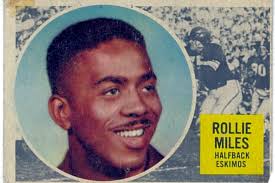Has Black History Month lost its meaning?
Posted on February 12, 2014 By Mike Ross Culture, Front Slider, Life
 Edmonton has a black history of its own. A notable example is the artistic and prosperous family of Rollie Miles, who came from America to be a star for the Edmonton Eskimos during the ‘50s and ‘60s. They even named a sports field after him. That’s history.
Edmonton has a black history of its own. A notable example is the artistic and prosperous family of Rollie Miles, who came from America to be a star for the Edmonton Eskimos during the ‘50s and ‘60s. They even named a sports field after him. That’s history.
“This very chance specific occupation that my grandfather had – football player – brought our entire family to Edmonton,” says grandson Rollie Pemberton, perhaps better known as the rapper Cadence Weapon (top picture). “My mom and almost all my cousins are based in Edmonton. And it’s all because of that one thing. We could easily have been in Washington D.C. or Northern Carolina, where my ancestors are from.”
Cadence Weapon – whose father Teddy Pemberton was the first DJ to play hip hop on the radio in Edmonton (on CJSR), and whose uncle is Edmonton saxophonist Brett Miles – has since moved to Montreal. He’ll be back in Edmonton on Saturday, Feb. 15 to DJ and read poetry at the next Art Gallery of Alberta Refinery Party – which as far as can be determined has nothing to do with Black History Month.
On his past, the 28-year-old rapper says, “Growing up in Edmonton, I felt like an alien. There weren’t a lot of blacks in Edmonton.”
Cunningham, 39, has similar feelings, “I felt ostracized all the time, because I was oftentimes the only black kid in a school full of Ukrainians.”
This has obviously changed. There’s been a huge influx of African immigrants during the last 10 years – following the same Edmontonian pattern as the Vietnamese, Lebanese, Germans and other cultures before them: From trouble at home, you move here. You live and work in the inner city, near the aptly-named Avenue of Nations, then spread out with each new generation as you prosper.
Cunningham complains of being hired for gigs in February just because she’s black and that it’s Black History Month, and no one seems interested in exploring it any further, but adds that she appreciates that the gesture is “kind-natured.” Instead of black, she prefers to use the term “black diaspora” to apply to all black people because, she says, “We can trace ourselves, all of us, back to Africa to some degree.”
The same can be said of every human being who has ever lived.
Share this:
1 2











